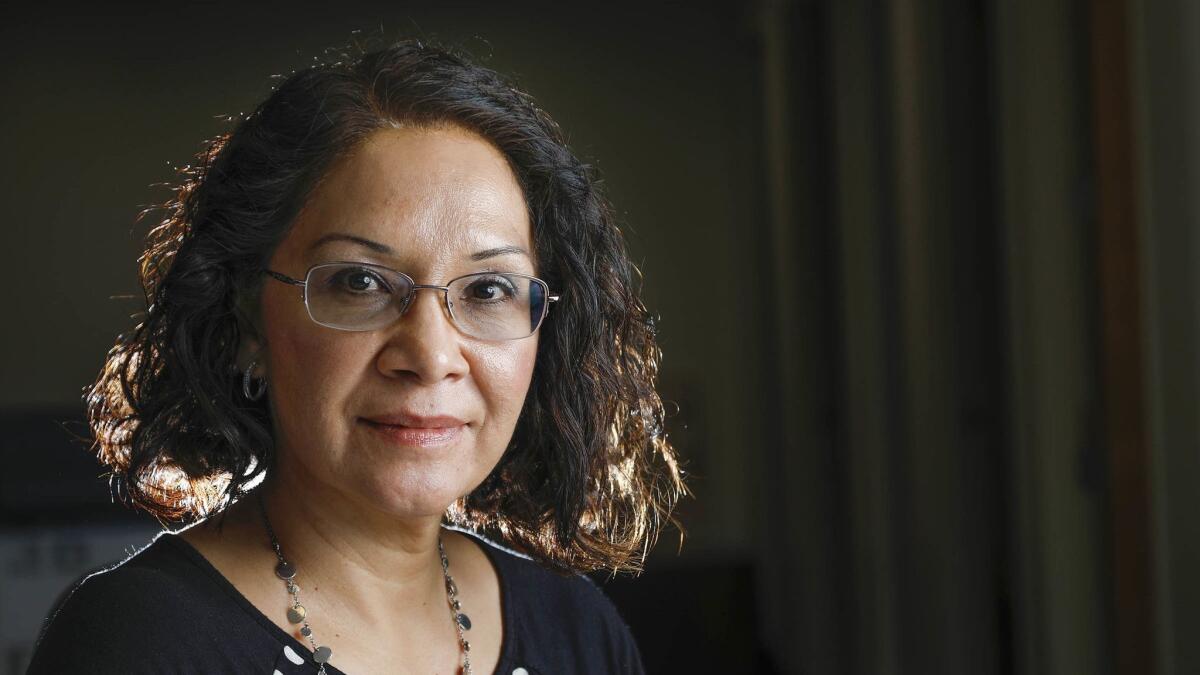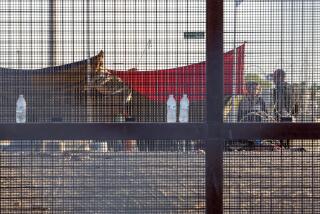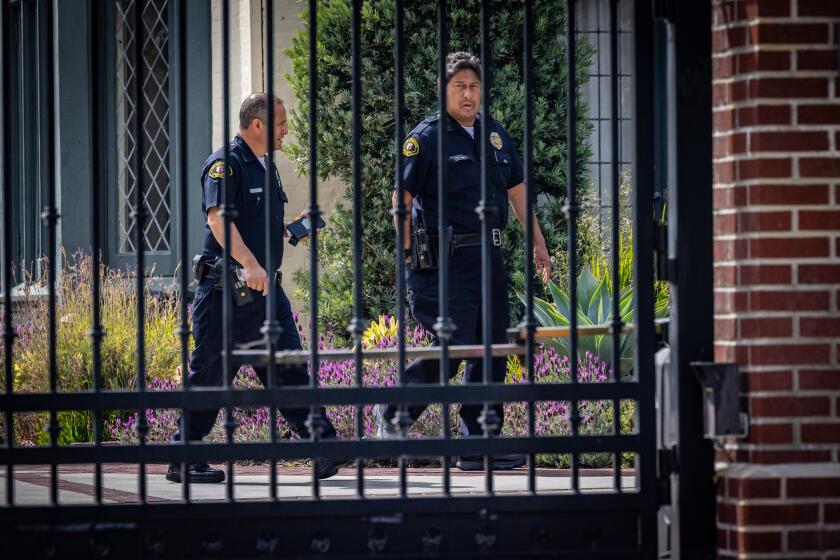Casa Cornelia works to represent children in San Diego immigration court

A 17-year-old boy sat in the back of a packed courtroom Tuesday morning in downtown San Diego watching children with attorneys at their sides go before an immigration judge.
He noticed a blond, curly-haired man who sat at the front to speak for 12 of the 18 children scheduled that day on Judge Philip Law’s 8 a.m. juvenile docket.
When the judge took a break, the boy approached the blond man as he prepared to leave. The boy explained that he didn’t have an attorney and asked for advice.
The man, Matthew Cannon, said he didn’t know if the judge would give him more time to find an attorney. Cannon handed the teen one of his cards and told the boy to call if the judge did.
Cannon works for Casa Cornelia Law Center, one of the few organizations in San Diego that offers pro bono attorneys in immigration cases and the only one that represents detained children.
Without attorneys, minors in immigration court proceedings have to navigate a set of laws as thick and complex as tax codes, and attorneys are not provided even for toddlers.
When Law returned, the boy begged him for another chance, explaining that his father hadn’t yet been able to afford an attorney.
“If you give me another date, I promise I will have an attorney,” he told the judge through a Spanish interpreter.
Law was skeptical until the boy pulled out Cannon’s card. Law told the boy he could have one last chance.
Children in the immigration system
When children arrive at the southwest border by themselves, a migration trend that has happened for decades, the federal government puts them in the custody of the Office of Refugee Resettlement.
Those held in San Diego are sent to a set of facilities run by Southwest Key in El Cajon and Lemon Grove with 65 beds for boys and 25 beds for girls. Children generally stay at one of these facilities until they can be placed with sponsors or foster families.
If they turn 18, they are transferred to adult detention centers.
Attorneys from Casa Cornelia screen every child who passes through Southwest Key’s San Diego facilities, teaching them what rights they have in the immigration system, explaining what options they have to try to stay in the U.S. based on their individual cases and offering to represent them for free.
In general, there are two main options for arriving children.
If they can show they’ve been persecuted or fear persecution based on their race, religion, nationality, political opinion or membership in a particular social group, they can apply for asylum.
The asylum process for unaccompanied children is notably different from that for arriving adults. While adults have to argue their cases in front of immigration judges and with opposition from ICE attorneys, children submit applications to U.S. Citizenship and Immigration Services.
Asylum officers from USCIS interview the children in person in a non-adversarial setting and have authority to grant asylum. If a child doesn’t get approval from an asylum officer, he or she can try again in a court setting similar to the adult process.
If children can prove they have been neglected, abandoned or abused, they can apply to be recognized as special immigrant juveniles in state court. Once the state gives a child this designation, he or she can apply for special status from USCIS and then a green card.
In other cases, children might be eligible for visas for victims of certain crimes or human trafficking.
While each of these paths to staying in the U.S. require processing from an agency separate from immigration court, children generally have to keep checking in with immigration judges until that processing is finished.
Casa Cornelia’s children’s program
Casa Cornelia got its start 25 years ago representing asylum seekers from Central America and Africa.
Its children’s program began in 2001 when founder Sister Ann Durst learned of a child from India appearing in immigration court by himself, according to associate director Elizabeth Camarena, who first volunteered with the organization in the 1990s.
“When Sister Ann found out, we committed to representing all of them,” Camarena said.
Cannon, with his jovial personality and fondness for dad jokes, said he prefers representing children.
“Adults who come in with claims are very serious,” said Cannon, who is director of the children’s program. “Kids, if you’re too serious, will crumble under the weight of it all.”
Cannon joined the children’s program team shortly before a surge of unaccompanied minors from Central America began arriving at the border in 2014.
“I’d never directly experienced that level of human suffering before,” Cannon recalled. “It definitely shaped not only who I am as an attorney but also who I am as a person.”
In recent years, children made up about 40% of the organization’s clients.
In 2017, the organization helped 954 children with their immigration cases, and in 2016, its attorneys represented 999.
While their cases are based in immigration law, many of the attorneys emphasized that they were drawn to the organization because they wanted to do human rights work.
“You see the best and worst in humanity in this sort of job,” Cannon said.
He recalled one of his first special immigrant juvenile status cases, a set of siblings who had been kidnapped and abused by their father.
Using an elaborate escape plan, the siblings fled to the U.S. border. Despite years away from school, the older sister flourished, getting straight As, Cannon said.
“It blew my mind that she was able to do that,” Cannon said. “She has impressed me more than any person I can think of.”
Family separations and a flood of volunteers
Though public outrage over the issue of families separated at the U.S.-Mexico border peaked at the beginning of the summer, Casa Cornelia attorneys saw separations happening on a smaller scale for much longer.
Cannon emphasized that circumstances have separated all of the children who arrive at the border from their parents, though for many, violence in their countries of origin or perils on the journey north are the culprit instead of U.S. government officials.
The first client he represented who had been split from his father by border officials was being held as a material witness in a smuggling case in federal criminal court, a different process from a child who is waiting for immigration proceedings.
The family needed to be held locally so they could get to the Southern District of California federal court building, and there is no detention center in San Diego that is authorized to hold children and adults together.
In other cases, Casa Cornelia attorneys met children who had been separated because of suspected abuse or trafficking.
They noticed more separations happening around Christmas of last year, and those numbers increased through the first half of 2018.
Evelyn Lopez, an attorney who helps with the children’s program, noticed a difference in what mattered to the recently separated children.
The children who arrived alone count down the days until their cases are finished, Lopez said, while the children who arrived with family count up the days they have been separated.
“I wish [people] could just see them as children,” Lopez said. “I think too often people look at them as ‘foreign’ or ‘illegal aliens,’ and they don’t stop and think, ‘These are little kids, and they’re afraid.’”
When members of the public became aware of the separations, Casa Cornelia received an outpouring of support through both monetary donations and new volunteers.
Katherine Paculba Lacher, who runs the volunteer attorney program, said it’s no small task to take on a pro bono immigration case, which can take between 50 and 150 hours depending on the details.
The reward is also considerable, she said.
“One volunteer told me he’s practiced for 20 years, and it was the most significant moment in his professional life,” Paculba Lacher said.
Changing case law and increasing uncertainty
As the drama of what will happen to separated children plays out in federal court, Casa Cornelia attorneys worry about something else — how other changes from the Trump administration have made outcomes in children’s cases much less certain.
“The shifting is not only constant but at times very abrupt,” Camarena said. “The drastic degree in which change has happened, that is the most striking difference.”
When Atty. Gen. Jeff Sessions in June reversed a Board of Immigration Appeals decision that set precedent for asylum-seeking women fleeing domestic violence, his narrow interpretation of what counted as a “particular social group” in asylum applications affected cases of children fleeing domestic or gang violence, Camarena said. Attorneys scrambled to review pending applications and submit additional arguments under the new case law.
As most of the options that children have to stay in the U.S. require application approval outside of immigration court, two other recent decisions from Sessions have made at least one San Diego judge question whether he can keep giving more time for those applications to process.
One of Cannon’s clients on Tuesday, a teenage girl, has been waiting for Southwest Key to release her to her brother who has applied to sponsor her. The girl intends to apply for special immigrant juvenile status, Cannon told Judge Law, but she can’t do that while she’s still in custody at Southwest Key.
While the government attorney said she didn’t oppose giving the girl more time, Law pushed back, questioning whether he had the authority given Sessions’ tightening of a legal test that dictates when immigration judges can issue continuances.
“What’s the hold up?” Law asked Cannon.
“That’s the million-dollar question with a lot of cases right now,” Cannon responded, explaining that there is a growing backlog of sponsorship applications and that children are staying in federal custody longer.
Law pushed the government attorney to find out more about when the girl might be released and reset the case for one more month.
Morrissey writes for the San Diego Union-Tribune.
kate.morrissey@sduniontribune.com
More to Read
Start your day right
Sign up for Essential California for news, features and recommendations from the L.A. Times and beyond in your inbox six days a week.
You may occasionally receive promotional content from the Los Angeles Times.







